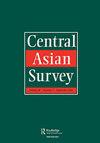The conceptual evolution of poverty alleviation through labour transfer in the Xinjiang Uyghur Autonomous Region
IF 1.8
3区 社会学
Q2 AREA STUDIES
引用次数: 2
Abstract
ABSTRACT This paper argues that in China’s Xinjiang Uyghur Autonomous Region, work placements of re-education detainees and Xinjiang’s implementation of the national Poverty Alleviation through Labor Transfer programme for the transfer of rural surplus labourers operate under fundamentally different policies. Drawing on new documentary and witness evidence, it is argued that within Xinjiang’s unique context of frontier settler colonialism, its recent coercive labour transfer programme evolved alongside decades-long efforts to facilitate surplus labour transfers throughout China. From 2014, when Beijing shifted the region’s work focus towards de-extremification, Uyghur underemployment was framed as a matter of social stability and national security. Between 2017 and 2019, labour transfer coercion dramatically increased alongside campaigns of mass internment and of enforcing poverty alleviation work goals. Xinjiang’s shift in 2021 from a campaign-style mobilizational to an institutionalized approach deepens coercive risks of this often poorly understood coercive labour strategy.新疆维吾尔自治区劳动力转移扶贫的观念演变
本文章由计算机程序翻译,如有差异,请以英文原文为准。
求助全文
约1分钟内获得全文
求助全文

 求助内容:
求助内容: 应助结果提醒方式:
应助结果提醒方式:


